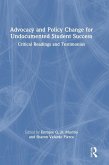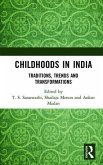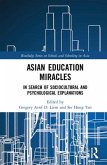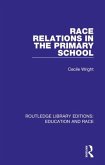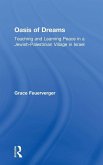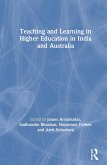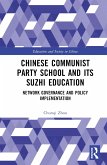Critical Issues in ELT
Herausgeber: Kaushik, Ruchi; Khanna, A L
Critical Issues in ELT
Herausgeber: Kaushik, Ruchi; Khanna, A L
- Gebundenes Buch
- Merkliste
- Auf die Merkliste
- Bewerten Bewerten
- Teilen
- Produkt teilen
- Produkterinnerung
- Produkterinnerung
This book presents contemporary debates on critical issues related to English language teaching, primarily in India. It discusses the challenges in ELT and also includes papers discussing theoretical positions/frameworks, classroom-based action research projects, and personal narratives.
Andere Kunden interessierten sich auch für
![Advocacy and Policy Change for Undocumented Student Success Advocacy and Policy Change for Undocumented Student Success]() Advocacy and Policy Change for Undocumented Student Success180,99 €
Advocacy and Policy Change for Undocumented Student Success180,99 €![Childhoods in India Childhoods in India]() Childhoods in India188,99 €
Childhoods in India188,99 €![Asian Education Miracles Asian Education Miracles]() Asian Education Miracles187,99 €
Asian Education Miracles187,99 €![Race Relations in the Primary School Race Relations in the Primary School]() Cecile WrightRace Relations in the Primary School86,99 €
Cecile WrightRace Relations in the Primary School86,99 €![Oasis of Dreams Oasis of Dreams]() Grace FeuervergerOasis of Dreams180,99 €
Grace FeuervergerOasis of Dreams180,99 €![Teaching and Learning in Higher Education in India and Australia Teaching and Learning in Higher Education in India and Australia]() Teaching and Learning in Higher Education in India and Australia179,99 €
Teaching and Learning in Higher Education in India and Australia179,99 €![Chinese Communist Party School and its Suzhi Education Chinese Communist Party School and its Suzhi Education]() Chunqi ZhouChinese Communist Party School and its Suzhi Education166,99 €
Chunqi ZhouChinese Communist Party School and its Suzhi Education166,99 €-
-
-
This book presents contemporary debates on critical issues related to English language teaching, primarily in India. It discusses the challenges in ELT and also includes papers discussing theoretical positions/frameworks, classroom-based action research projects, and personal narratives.
Hinweis: Dieser Artikel kann nur an eine deutsche Lieferadresse ausgeliefert werden.
Hinweis: Dieser Artikel kann nur an eine deutsche Lieferadresse ausgeliefert werden.
Produktdetails
- Produktdetails
- Verlag: Taylor & Francis
- Seitenzahl: 346
- Erscheinungstermin: 2. Dezember 2024
- Englisch
- Abmessung: 216mm x 140mm x 21mm
- Gewicht: 562g
- ISBN-13: 9781032885681
- ISBN-10: 1032885688
- Artikelnr.: 71237200
- Herstellerkennzeichnung
- Libri GmbH
- Europaallee 1
- 36244 Bad Hersfeld
- gpsr@libri.de
- Verlag: Taylor & Francis
- Seitenzahl: 346
- Erscheinungstermin: 2. Dezember 2024
- Englisch
- Abmessung: 216mm x 140mm x 21mm
- Gewicht: 562g
- ISBN-13: 9781032885681
- ISBN-10: 1032885688
- Artikelnr.: 71237200
- Herstellerkennzeichnung
- Libri GmbH
- Europaallee 1
- 36244 Bad Hersfeld
- gpsr@libri.de
Ruchi Kaushik is Associate Professor of English at Shri Ram College of Commerce, University of Delhi, India. She has authored Listening and Speaking XI (2014) and co-authored and co-edited Language, Literature and Creativity II (2013). Presently, she is Associate Editor of FORTELL: Journal of Teaching English Language and Literature. A.L. Khanna retired as Reader in English from Rajdhani College, University of Delhi. He co-edited Research in Applied Linguistics with R.K. Agnihotri. Presently, he is the Coordinating Editor of FORTELL: Journal of Teaching English Language and Literature and one of the Chief Editors of Language and Language Teaching.
Acknowledgements
Contributors
Introduction
I. Multilingualism
1. To Teach or Not to Teach Code-Mixed English? Translanguaging
Hindi-English
2. 'Warm Welcome or Cold Shoulder': Demystifying ('Positively Noxious')
English in the Multilingual Indian Classroom
3. From a Monolingual to a Multilingual Approach in Language Teaching
II. Critical Pedagogy
4. Critical Pedagogy and English Language Teaching in India
5. Processes and Protocols of Discourse Oriented Pedagogy Towards Resisting
Linguistic Imperialism
6. Critical Literacy as a Way of Negotiating Meanings with Stories
7. Making Daffodils Bloom for Everyone: The Flowering of Critical Pedagogy
in the ESL Classroom
III. Continuing Professional Development
8. The Dimensions of Continuing Professional Development
9. Learner Feedback as a Tool for Teacher Learning and Continuing
Professional Development
10. Data-led Reflection for Self-directed Continuous Professional
Development
11. An Action Research Project Exploring Peer
Mentoring Enabling CPD 172
IV. Materials Development
12. Training Teachers to be Materials Writers
13. Designing Customized ESP Materials: Principles, Procedure and Practice
14. Translanguaging, Spices and Authentic Materials
V. Assessment and Evaluation
15. In Teachers' Hands: Where Formative Assessment
Comes to Life in Unforeseen Ways
16. Peer Feedback in L2 Writing
17. Giving Feedback to Treat ESL Writing as a Process: Ideas and Challenges
18. Assessment for Development through Portfolios
VI. Technology-aided Teaching and Learning
19. From Black Board to White Board and Beyond: The Role of ICTs in
Reforming English Language Classrooms in Tamil Nadu
20. Bringing Digital Literacy into the ESL Classroom: Enhancing Language
Learning Tasks using Web 2.0 Tools
21. Design-Based Research for Technology Enabled Language Learning: From
Theory to Practice
22. Using Google Classroom as a Learning Management System: An Exploratory
Study
VII. Inclusive Education
23. Inclusive Practices: Equitable Learning for All
24. Lessons in Disability: Acceptance and Inclusion
Contributors
Introduction
I. Multilingualism
1. To Teach or Not to Teach Code-Mixed English? Translanguaging
Hindi-English
2. 'Warm Welcome or Cold Shoulder': Demystifying ('Positively Noxious')
English in the Multilingual Indian Classroom
3. From a Monolingual to a Multilingual Approach in Language Teaching
II. Critical Pedagogy
4. Critical Pedagogy and English Language Teaching in India
5. Processes and Protocols of Discourse Oriented Pedagogy Towards Resisting
Linguistic Imperialism
6. Critical Literacy as a Way of Negotiating Meanings with Stories
7. Making Daffodils Bloom for Everyone: The Flowering of Critical Pedagogy
in the ESL Classroom
III. Continuing Professional Development
8. The Dimensions of Continuing Professional Development
9. Learner Feedback as a Tool for Teacher Learning and Continuing
Professional Development
10. Data-led Reflection for Self-directed Continuous Professional
Development
11. An Action Research Project Exploring Peer
Mentoring Enabling CPD 172
IV. Materials Development
12. Training Teachers to be Materials Writers
13. Designing Customized ESP Materials: Principles, Procedure and Practice
14. Translanguaging, Spices and Authentic Materials
V. Assessment and Evaluation
15. In Teachers' Hands: Where Formative Assessment
Comes to Life in Unforeseen Ways
16. Peer Feedback in L2 Writing
17. Giving Feedback to Treat ESL Writing as a Process: Ideas and Challenges
18. Assessment for Development through Portfolios
VI. Technology-aided Teaching and Learning
19. From Black Board to White Board and Beyond: The Role of ICTs in
Reforming English Language Classrooms in Tamil Nadu
20. Bringing Digital Literacy into the ESL Classroom: Enhancing Language
Learning Tasks using Web 2.0 Tools
21. Design-Based Research for Technology Enabled Language Learning: From
Theory to Practice
22. Using Google Classroom as a Learning Management System: An Exploratory
Study
VII. Inclusive Education
23. Inclusive Practices: Equitable Learning for All
24. Lessons in Disability: Acceptance and Inclusion
Acknowledgements
Contributors
Introduction
I. Multilingualism
1. To Teach or Not to Teach Code-Mixed English? Translanguaging
Hindi-English
2. 'Warm Welcome or Cold Shoulder': Demystifying ('Positively Noxious')
English in the Multilingual Indian Classroom
3. From a Monolingual to a Multilingual Approach in Language Teaching
II. Critical Pedagogy
4. Critical Pedagogy and English Language Teaching in India
5. Processes and Protocols of Discourse Oriented Pedagogy Towards Resisting
Linguistic Imperialism
6. Critical Literacy as a Way of Negotiating Meanings with Stories
7. Making Daffodils Bloom for Everyone: The Flowering of Critical Pedagogy
in the ESL Classroom
III. Continuing Professional Development
8. The Dimensions of Continuing Professional Development
9. Learner Feedback as a Tool for Teacher Learning and Continuing
Professional Development
10. Data-led Reflection for Self-directed Continuous Professional
Development
11. An Action Research Project Exploring Peer
Mentoring Enabling CPD 172
IV. Materials Development
12. Training Teachers to be Materials Writers
13. Designing Customized ESP Materials: Principles, Procedure and Practice
14. Translanguaging, Spices and Authentic Materials
V. Assessment and Evaluation
15. In Teachers' Hands: Where Formative Assessment
Comes to Life in Unforeseen Ways
16. Peer Feedback in L2 Writing
17. Giving Feedback to Treat ESL Writing as a Process: Ideas and Challenges
18. Assessment for Development through Portfolios
VI. Technology-aided Teaching and Learning
19. From Black Board to White Board and Beyond: The Role of ICTs in
Reforming English Language Classrooms in Tamil Nadu
20. Bringing Digital Literacy into the ESL Classroom: Enhancing Language
Learning Tasks using Web 2.0 Tools
21. Design-Based Research for Technology Enabled Language Learning: From
Theory to Practice
22. Using Google Classroom as a Learning Management System: An Exploratory
Study
VII. Inclusive Education
23. Inclusive Practices: Equitable Learning for All
24. Lessons in Disability: Acceptance and Inclusion
Contributors
Introduction
I. Multilingualism
1. To Teach or Not to Teach Code-Mixed English? Translanguaging
Hindi-English
2. 'Warm Welcome or Cold Shoulder': Demystifying ('Positively Noxious')
English in the Multilingual Indian Classroom
3. From a Monolingual to a Multilingual Approach in Language Teaching
II. Critical Pedagogy
4. Critical Pedagogy and English Language Teaching in India
5. Processes and Protocols of Discourse Oriented Pedagogy Towards Resisting
Linguistic Imperialism
6. Critical Literacy as a Way of Negotiating Meanings with Stories
7. Making Daffodils Bloom for Everyone: The Flowering of Critical Pedagogy
in the ESL Classroom
III. Continuing Professional Development
8. The Dimensions of Continuing Professional Development
9. Learner Feedback as a Tool for Teacher Learning and Continuing
Professional Development
10. Data-led Reflection for Self-directed Continuous Professional
Development
11. An Action Research Project Exploring Peer
Mentoring Enabling CPD 172
IV. Materials Development
12. Training Teachers to be Materials Writers
13. Designing Customized ESP Materials: Principles, Procedure and Practice
14. Translanguaging, Spices and Authentic Materials
V. Assessment and Evaluation
15. In Teachers' Hands: Where Formative Assessment
Comes to Life in Unforeseen Ways
16. Peer Feedback in L2 Writing
17. Giving Feedback to Treat ESL Writing as a Process: Ideas and Challenges
18. Assessment for Development through Portfolios
VI. Technology-aided Teaching and Learning
19. From Black Board to White Board and Beyond: The Role of ICTs in
Reforming English Language Classrooms in Tamil Nadu
20. Bringing Digital Literacy into the ESL Classroom: Enhancing Language
Learning Tasks using Web 2.0 Tools
21. Design-Based Research for Technology Enabled Language Learning: From
Theory to Practice
22. Using Google Classroom as a Learning Management System: An Exploratory
Study
VII. Inclusive Education
23. Inclusive Practices: Equitable Learning for All
24. Lessons in Disability: Acceptance and Inclusion


